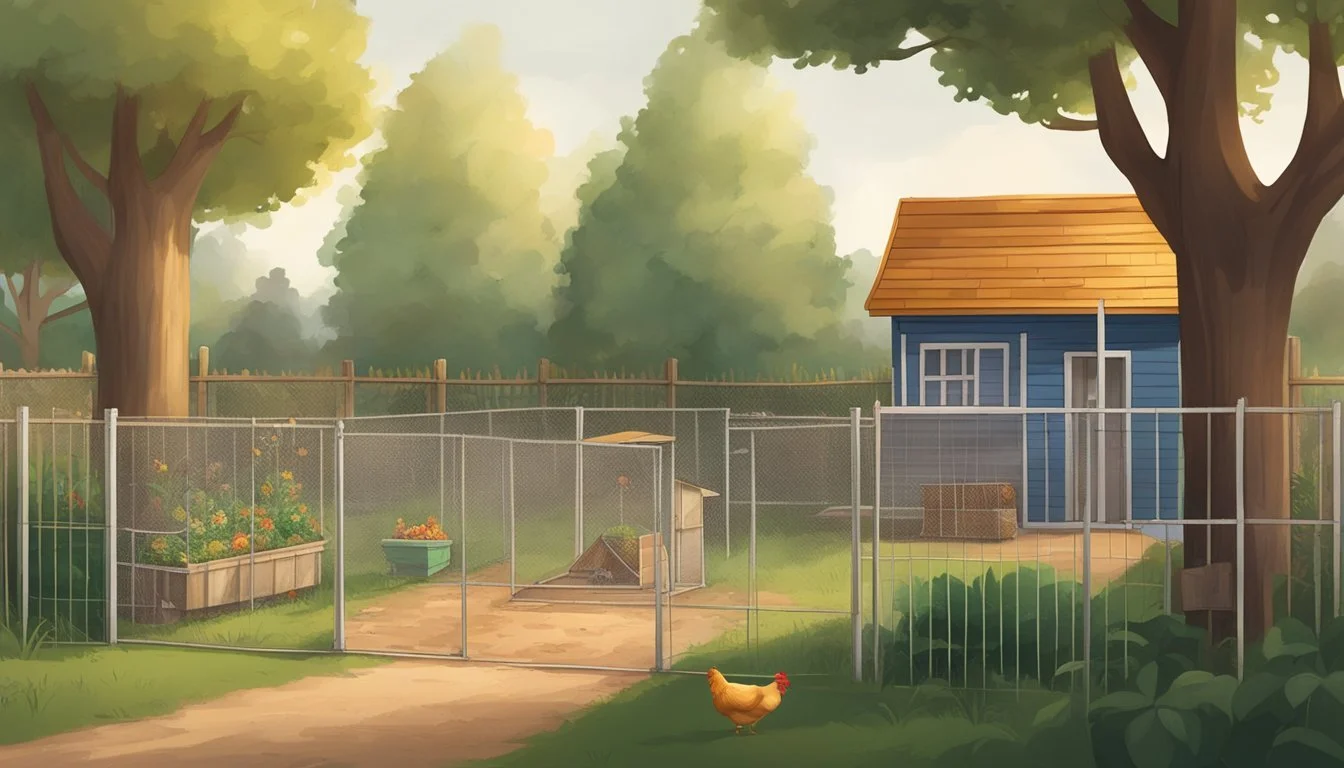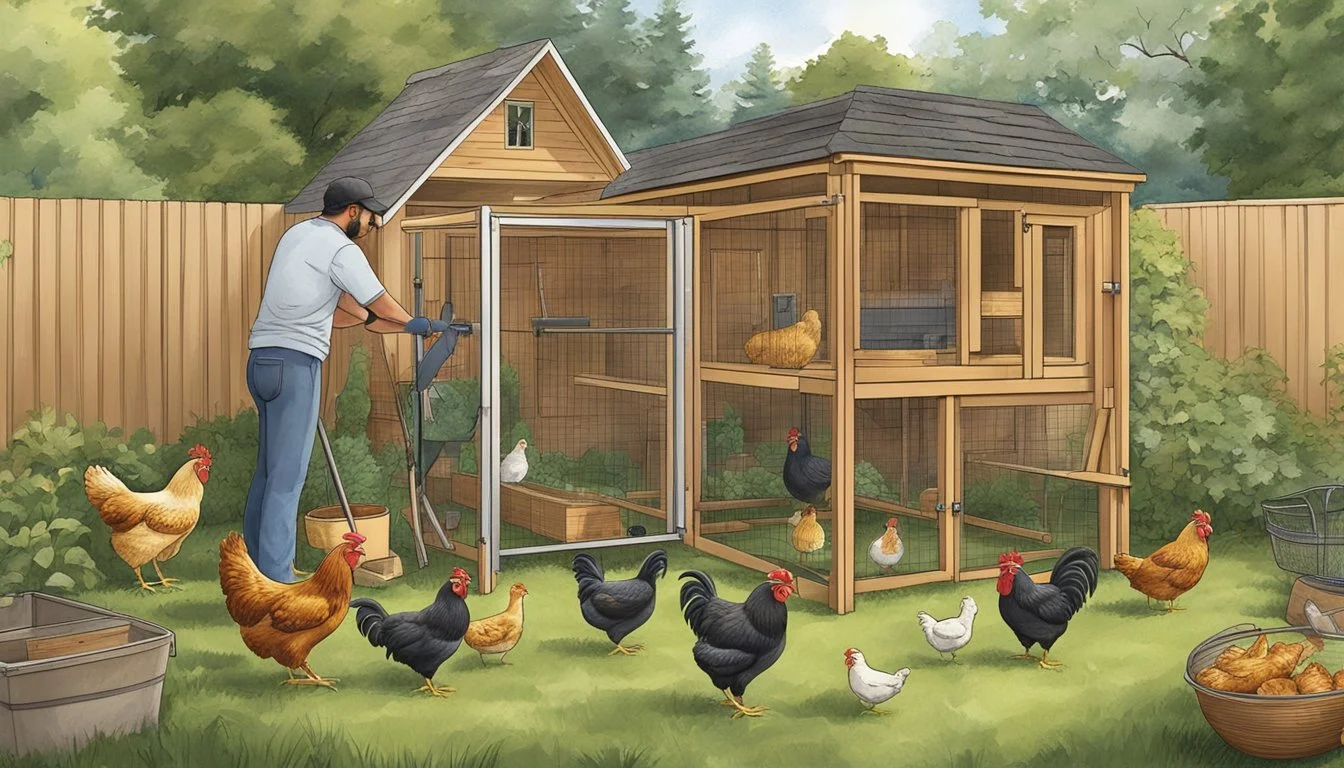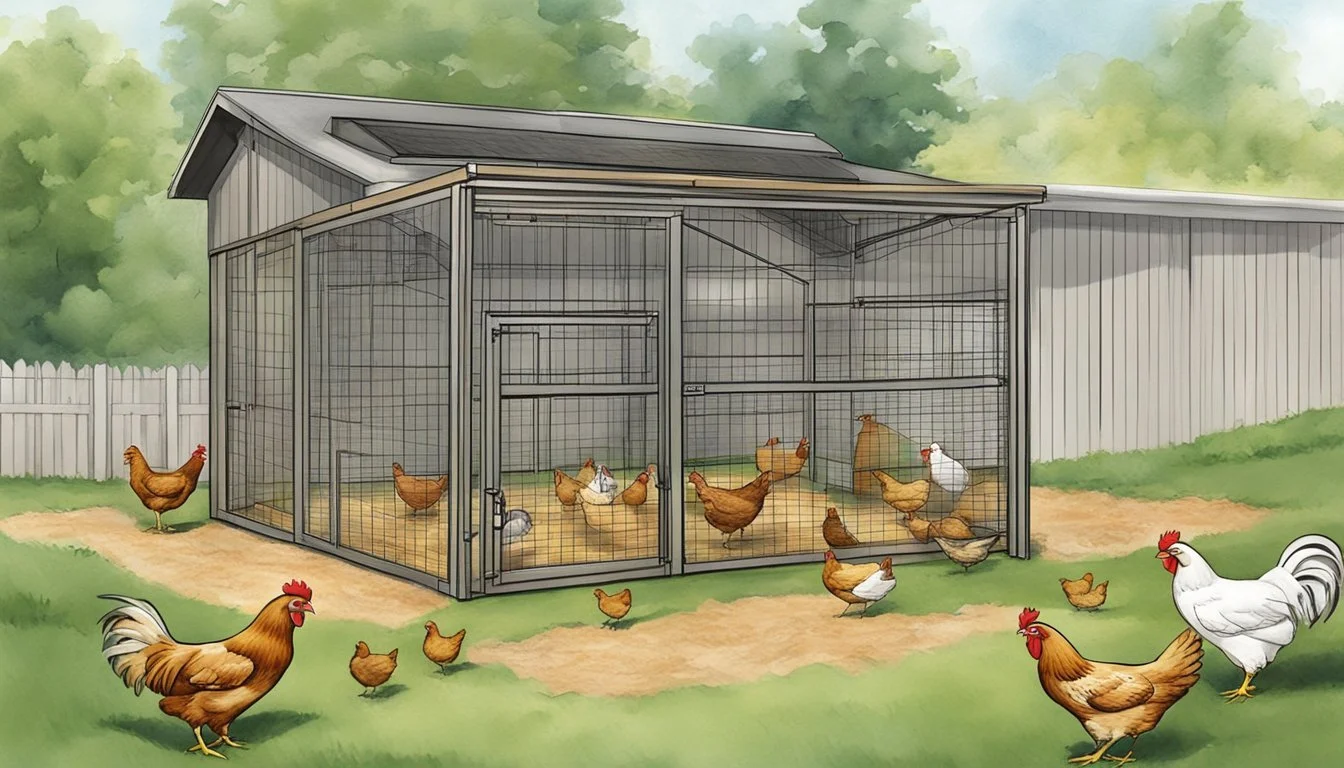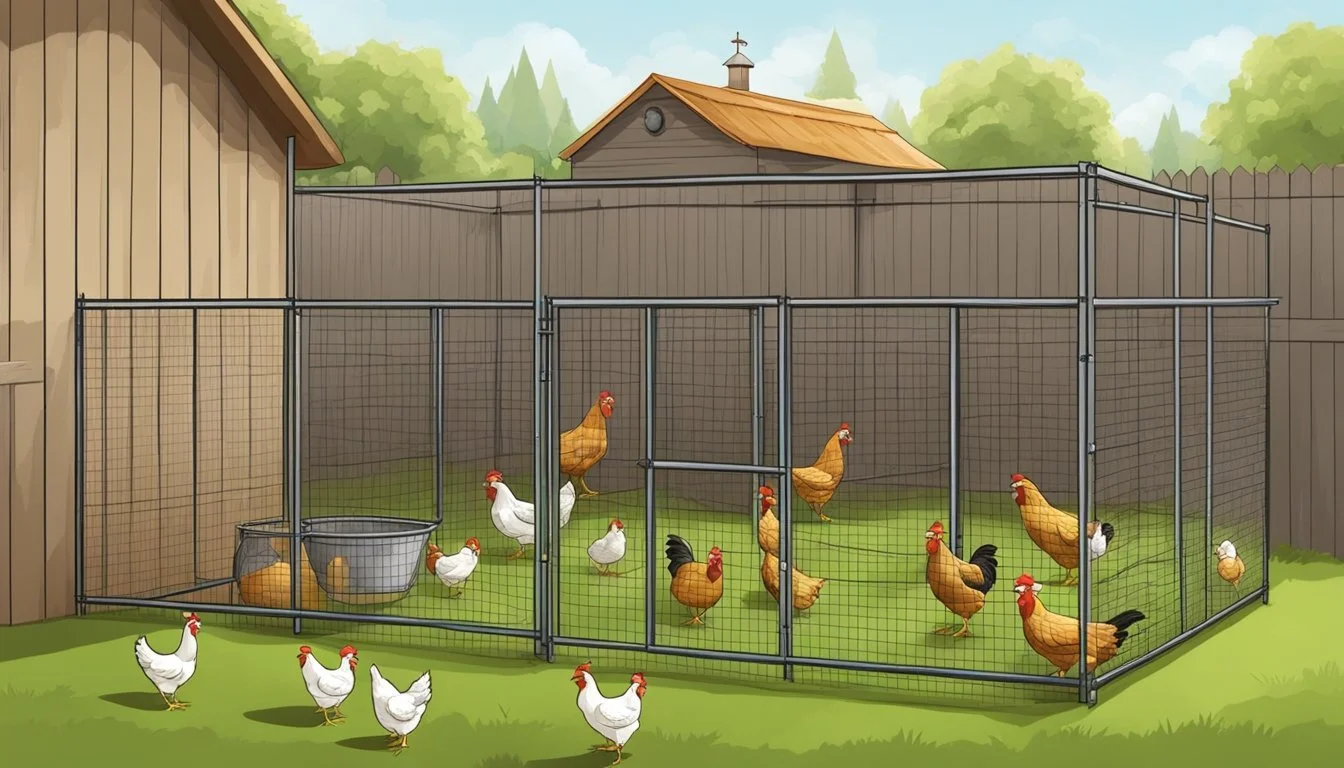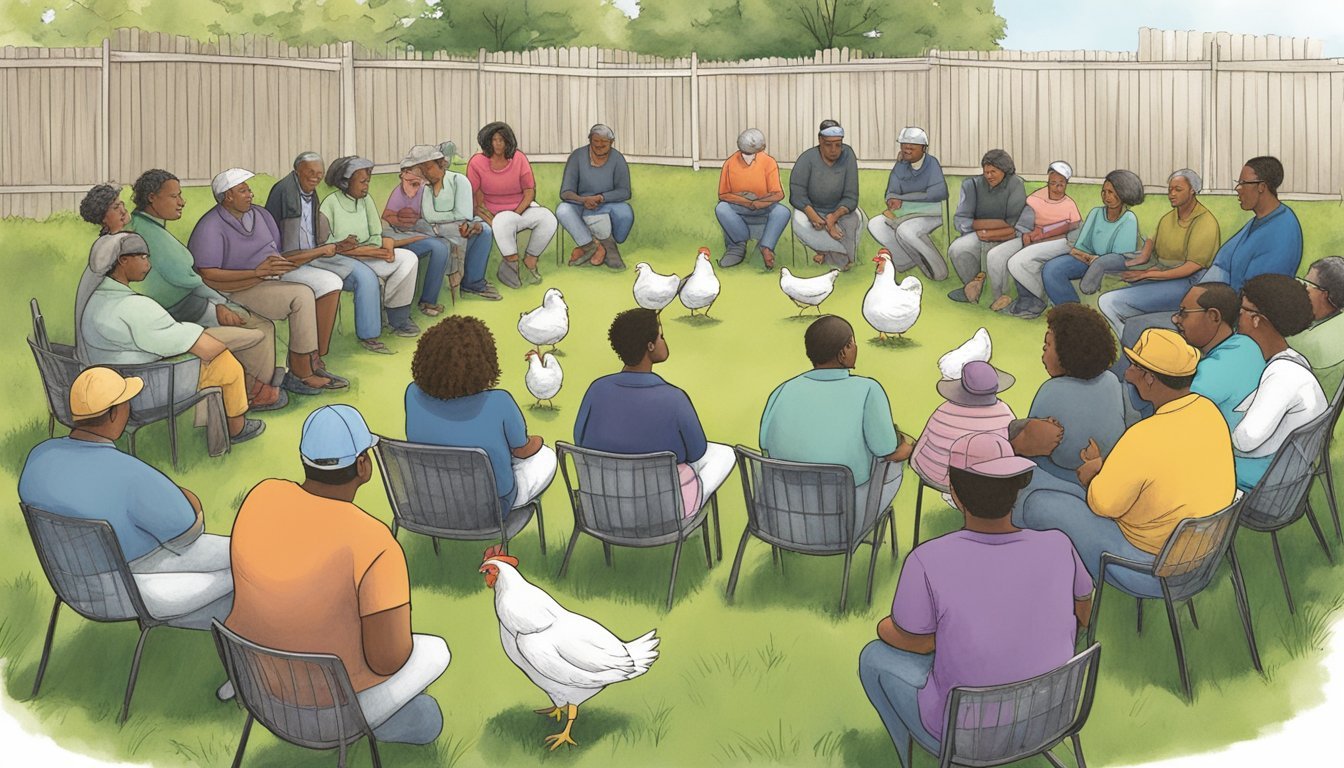Keeping Backyard Chickens in Columbus, OH
Essential Tips for Urban Poultry Farmers
Backyard chicken (how long does chicken last?) keeping has risen in popularity among residents who seek the charm of rural life within the urban environment of Columbus, Ohio. The city caters to this growing interest by allowing the keeping of chickens in residential backyards, a practice that encourages sustainability and provides the joy of fresh eggs. Before embarking on this venture, prospective chicken keepers in Columbus must navigate a series of regulations designed to maintain harmony within the community and ensure the welfare of the birds.
To legally keep chickens in Columbus, homeowners are required to obtain a permit. The local laws are tailored to balance the interests of chicken enthusiasts with those of their neighbors, stipulating that while up to four chickens can be kept, roosters are excluded to minimize noise disruptions. Moreover, the city has specific requirements pertaining to the housing of backyard chickens, which involve maintaining structures with impervious flooring to guarantee cleanliness and hygiene.
Individuals in Columbus considering the addition of chickens to their backyards must also be aware of the potential need to consult with their local zoning office. While the city broadly permits the practice, certain areas may have additional restrictions or guidelines that must be followed. As such, engaging with local authorities and neighbors is an important step in the journey toward responsible and enjoyable chicken keeping in Columbus.
Benefits of Raising Chickens in Columbus
Raising chickens in Columbus, Ohio, offers a multitude of benefits for both residents and the community. One of the primary advantages is the access to fresh eggs. Fresh eggs from backyard chickens can be more nutritious and flavorful compared to those bought from a store, as they are often fresher and hens can be fed a high-quality diet.
Sustainable living is another key benefit. Laying hens contribute to a sustainable lifestyle by providing a way to recycle food scraps into valuable compost materials, reducing household waste. In turn, the compost enriches garden soil, fostering a cycle of sustainability.
Poultry keeping in an urban setting encourages food independence and can lead to a reduction in the carbon footprint associated with transporting food items over long distances. It connects residents to the food they consume, offering insights into the origins and production of eggs. Furthermore, hens contribute to pest control, naturally reducing the number of insects in one's yard.
Lastly, keeping chickens can have social and educational aspects. Families with children gain the chance to educate the younger members about responsibility, animal care, and the importance of local food sources.
In summary, Columbus citizens who choose to engage in backyard chicken-keeping enjoy a range of advantages, from enhancing their nutrition and reducing their waste, to contributing positively to their local environment and society.
Understanding Local Chicken Laws
When considering raising backyard chickens in Columbus, Ohio, it's essential to be aware of the specific regulations that govern the practice. These laws are in place to ensure public health, animal welfare, and community harmony.
Columbus City Ordinances
Columbus requires residents to obtain a permit for keeping chickens. The city allows up to four chickens per household, but roosters are prohibited due to noise concerns. All coops must have an impervious floor to maintain sanitary conditions.
Franklin County Regulations
Outside Columbus city limits, regulations may differ. Franklin County encompasses several municipalities, each with its own rules regarding backyard chickens. Residents should check with local zoning offices for specifics.
Permit and Inspection Requirements
Prospective chicken owners in Columbus need to apply for a permit through Columbus Public Health. An inspection might be necessary to ensure coops meet the city's health and construction standards.
Zoning and Placement Guidelines
The Zoning Office in Columbus provides guidelines on where a chicken coop can be placed on residential property. Coops must be situated to minimize any disturbances to neighbors and maintain the property's aesthetic.
Surrounding Areas' Policies
Policies can vary considerably in nearby areas like Hilliard, Gahanna, Cleveland, Cincinnati, Akron, Toledo, and Elyria. Each city may have its own set of rules on the number of chickens allowed and permit requirements.
Animal Welfare and Public Safety Concerns
The Health Commissioner emphasizes the need for proper care and maintenance of chickens to prevent issues related to animal welfare and public safety. Owners must ensure chickens have adequate space and sanitary conditions to prevent the spread of disease.
Sales and Distribution Regulations
In Columbus, residents are generally allowed to raise chickens for personal use. However, the sale of chickens or eggs may require additional permits and compliance with state regulations concerning food products.
Conditional Use and Exceptions
Certain residential areas might be eligible for conditional use permits that allow for variations from standard regulations. Special circumstances and exceptions are handled case-by-case, and it is best to consult the Columbus Public Health veterinarian for guidance.
Designing and Building a Chicken Coop
When constructing a chicken coop in Columbus, OH, it's crucial to address coop specifications, ensure protection from predators, maintain sanitary conditions, and consider the local climate. These factors are essential for the health and safety of the chickens and compliance with local regulations.
Coop Specifications and Size
The size of a chicken coop should accommodate the number of chickens being housed. A general guideline is to provide at least 3 to 4 square feet per chicken inside the coop. The coop must also meet Columbus, OH ordinances, which stipulate that the structure should be 100 feet away from the street line. For the coop floor, impermeable materials such as tile, vinyl, or treated wood are recommended to prevent pests and maintain sanitary conditions.
Recommended Minimum Coop Sizes:
3 chickens: 9 to 12 sq ft
5 chickens: 15 to 20 sq ft
10 chickens: 30 to 40 sq ft
Protection Against Predators
A predator-proof enclosure is vital for animal welfare. The coop should have sturdy walls and a secure locking system. All openings must be covered with hardware cloth - not chicken wire - to keep out predators. Additionally, bury the wire at least a foot deep around the perimeter to deter digging animals.
Key Features for Predator Protection:
Walls and doors: Solid construction with no gaps
Locks: Raccoon-proof locks on doors and nesting boxes
Wire: Hardware cloth instead of chicken wire
Sanitation and Manure Management
Sanitation is paramount for public health and the wellbeing of the chickens. Coops must be regularly cleaned to prevent the buildup of manure, which should be composted or managed properly. An easy-to-clean coop with a removable dropping tray can facilitate sanitation. Ensure the coop has adequate ventilation to keep the air fresh and reduce moisture.
Sanitation Checklist:
Removable trays for droppings
Regular cleaning schedule
Appropriate waste disposal or composting
Climatic Considerations for Columbus, OH
In Columbus, OH, weather conditions vary from hot summers to cold winters. The chicken coop should provide shelter from the elements, with proper insulation for winter and ventilation for summer. Selecting chicken breeds that are adaptable to local climate conditions can also contribute to their resilience and comfort.
Weatherproofing Tips:
Insulation: Protects against cold winter temperatures
Ventilation: Allows air circulation during hot weather
Breed selection: Choose breeds suited for Columbus, OH climate
Daily Care and Management
When maintaining a backyard chicken coop in Columbus, Ohio, keeping a consistent daily routine ensures the health and productivity of the hens, particularly the laying ones.
Feeding: Chickens must have constant access to nutritionally balanced feed. Laying hens typically consume about 1/4 pound of feed per day. They require a diet containing 14-17% crude protein, which is best served as pellets or crumbles. It's crucial to adjust feed based on age, breed, and purpose.
Watering: Provide clean, fresh water daily. Chickens drink approximately one pint of water each day, but this can increase in hotter months. Waterers should be cleaned regularly to prevent the spread of disease.
Egg Collection: Laying hens need daily egg collection to encourage continual laying and to prevent egg breakage or eating.
Health Care: Observing the chickens daily for signs of stress or illness is important. Common signs to look out for include changes in eating or laying patterns, lethargy, or visible signs of distress.
Coop Cleaning: While not a daily task, the coop should be kept clean with regular removal of waste and spent bedding. An impervious floor assists in maintaining hygiene and eases cleaning.
Secure Housing: Every night, chickens must be secured to protect against predators. Ensure the coop is properly enclosed with no gaps or holes.
Staying attentive to these daily care needs will provide a healthy environment for backyard chickens, ensuring they remain productive and content.
Health and Nutrition
Proper nutrition is crucial for backyard chickens in Columbus to maintain their health and maximize egg production. Laying hens require a balanced diet that meets their specific nutritional requirements to stay healthy and productive.
Feed should consist of a quality layer pellet or crumble containing approximately 16% protein. It is essential to provide enough calcium, which can be supplied by offering oyster shell as a supplement. A lack of calcium can lead to weak shells and negatively affect the health of the hen.
Here are the key components of a chicken's diet:
Proteins: Essential for growth and egg production.
Carbohydrates: Provide energy for daily activities.
Fats: Necessary for energy and absorption of vitamins.
Vitamins and Minerals: Crucial for immune health and eggshell quality.
Chickens also require access to fresh water at all times, as water plays a key role in their overall health and egg development.
In terms of environmental health, chickens should live in clean conditions with access to fresh air and space to roam. Coops should be kept free from dampness and pests, as these can lead to health issues.
Nutritional deficiencies or excesses can lead to health problems such as obesity, reduced egg production, and increased susceptibility to diseases. Regular observation can help detect any health issues early on. It is advisable for Columbus residents to consult a veterinarian familiar with poultry to ensure their chickens receive proper care.
Maintaining a clean environment and a balanced diet is indispensable for the well-being of backyard chickens.
Egg Production and Harvesting
Backyard chicken keeping in Columbus, OH, means understanding the nuances of egg production and harvesting. Laying hens typically begin to produce eggs at around six months of age, and peak production usually occurs in the first two years. The frequency of laying can vary based on breed, daylight hours, and the health of the chicken.
Egg Harvesting
Eggs should be collected regularly from hens to ensure freshness and to encourage continuous laying. They usually lay in the early hours, so a morning harvest is ideal. When gathering eggs:
Inspect for cleanliness: Clean any dirt off with fine sandpaper or a dry cloth. Wet washing can remove the natural protective coating.
Check for cracks: Discard cracked eggs to prevent contamination.
Egg Storage
After collecting the eggs, they should be stored properly:
Temperature: Store eggs at cool temperatures, ideally in a refrigerator.
Positioning: Keep them pointed end down to maintain freshness.
Duration: Fresh eggs can be refrigerated for up to five weeks.
Note on Regulations
Residents of Columbus who keep chickens should adhere to local guidelines for both coop specifications and the number of hens allowed, which can influence egg production numbers.
A routine that includes proper care, clean facilities, and consistent egg collection and storage practices will lead to successful egg production and harvesting in a backyard setting.
Common Challenges and Solutions
When keeping backyard chickens in Columbus, OH, residents may face a few common challenges. Understanding these and implementing effective strategies can ensure a harmonious and healthy backyard flock.
Predators: Chickens attract a variety of predators such as raccoons, hawks, and foxes.
Solution: Secure housing is crucial. Coops should have sturdy mesh wire that extends underground to prevent digging, and locks that cannot be easily manipulated by raccoons.
Diseases: Chickens are susceptible to a range of diseases, including avian influenza and salmonella.
Solution: Regular veterinary check-ups, vaccinations, and cleanliness in coops can mitigate disease risks.
Noise: Hens can be noisy, particularly when laying eggs, potentially leading to noise complaints.
Solution: While hens are quieter than roosters (which are not permitted in Columbus), owners can reduce noise by keeping chickens well-fed and comfortable, and by strategic coop placement away from neighboring bedrooms.
Neighbor Relations: The proximity of coops to neighbors can affect relations, especially if there are odor issues or chickens escape.
Solution:
Engage in open communication with neighbors to address concerns proactively.
Keep the coop clean to minimize odors.
Maintain proper fencing.
Challenge Solution Predators Secure coops with reinforced mesh and locks. Diseases Regular health checks, vaccinations, and clean coops. Noise Strategic coop placement; maintain hen comfort. Neighbor Relations Communication, coop cleanliness, proper fencing.
By addressing these challenges with thoughtful solutions, chicken owners in Columbus can enjoy the benefits of fresh eggs and the pleasures of poultry-keeping while remaining within the legal framework and maintaining good neighborly relations.
Community Engagement and Resources
Residents in Columbus, Ohio, interested in backyard chicken keeping can find numerous resources and community support structures to assist with their endeavor. Community gardens often become hubs for exchange of information on urban agriculture, and those with space may even accommodate chickens, providing a hands-on learning environment.
Local Farming Groups
Groups like the Columbus Urban Farmers Network share resources, expertise, and support, often holding meetings where individuals can learn best practices for raising chickens in an urban setting.
Educational Workshops
The city sees regular workshops on urban chicken farming, aimed at beginners and seasoned poultry keepers alike. These workshops cover a range of topics:
Proper chicken care
Coop construction
Compliance with local ordinances
Key Contact Points for Information:
Columbus Public Health: For permits and health information.
Local Veterinarians: Experts like Aaron K. Messer DVM, RS for animal health concerns.
Examples of Workshops and Groups:
Name Focus Areas Columbus Backyard Chicken Keepers Networking, Advice, Coop Tours City Fresh Workshops Sustainable Practices, Health Chicken Keepers of Central Ohio Monthly Meetings, Breed Info
Those partaking in these workshops find themselves better equipped to manage their chickens, staying informed about health concerns, coop maintenance, and local legislation ensuring responsible and successful chicken keeping.



